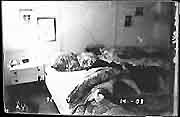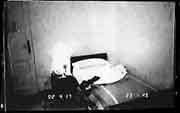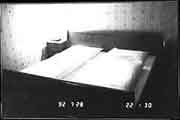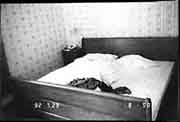---------------------[F.S.H. Home]
[Projects]
[Biografie]
[Texts]
[private room]
p r o v i s i o n a l 1992
--------------------------------------------------------Installation shown at:
Kunsthalle II, Innsbruck 1992
John Good Gallery, New York 1992
Galerie Otto Schweins, Köln 1992
Kunstmuseum Bonn, 1993
Bedroom Politics
an essay by Philip Pocock
Marcel Proust begins Remembrance of Things Past from bed. The
very first sentence in his trilogy states:
"For a very long time I used to go to bed early."
Passages from the narrator's own autobiography of sleep serve to better
describe the sense of privacy and temporality evoked by Felix Stephan
Huber's own bed photographs. Proust's personal epiphanies un-derscore
Huber's obsession like written snapshots with captions such as:
"...to savour, in an instanteous flash of perseption, the sleep
witch lay heavy upon the furniture, the room,"
click, then:
"When a man is asleep, he has in a circle round him the chain of
the hours, the sequence of the years,"
and awakening:
"everything would be moving round me through the darkness:
things, places, years."



 Things, places, years: These are entries in Huber's diary, his oevre
since 1982. Raum 4 is a view in Huber's bedroom at home. Unlike
the others silver prints in the show, it is constructed like much of his pre-
vious montageworks - built from roughly rectangular sheets or frames of
paper or celloid and temporarily hung on a wall. Like the entire instal-
lation, it is there provisionally.
Thirteen bedroom photographs: two of home; a pair from one hotel
and nine other provisional sleeping arrangements this year. The grainy
images in this show, like film, publicize private stories. Serving this
theme, his subjects, a travelogue of bed[room] images gaze into by means of
taping off areas indexes the gallery as a sort of Asylantenheim.
Bands of tape all over the room illiterately extend the photographs
into a no-name public space. The body politic is indexed as abstract, out-
side the fictive space of Huber's private rooms. Political scenes, public
archetipes are mapped out on the floor and walls with tape - twenty-one
bed outlines in three rows on the floor and up the walls. Prison? A night
in jail in New York? A camp for displaced persons? War in Yugoslavia?
Huber's installation represents the public in the form of concrete
chaos; unstable, restless, outside influence. the photographs, personal
recollections of where he stayed the night remain private, concrete time
alone, when memory clocks start their ticking inside us.
Neptune's son by mortal mother, a giant named Procrustes lured
and bound unsuspecting travellers to his notorious iron bedstad.
Where they too long or wide for it, he lopped off a limb: If too short, he
sadistically streched them to fit. The myth of his bed invents a macabre
souvenir of how erotic and political desires tragically interchange.
Procrustian beds show up daily in newspapers - cotts in refugee
camps, homeless shelters, crime scenes, natural disasters - as people are
assigned makeshift, temporary quarters in Jordan, Somalia, the former
GDR or elswhere. They all start to look generic like the faces of victims
and murderers by Christian Boltanski, hauntingly homogenizing every-
one into one pure thing - identity.
The ordinariness in Felix Stephan Huber's bed[rooms] blurs their
inividuality too. And boredom, the erotic, routine begin to feel vaguely
alike. The thing remains, where this all takes place, the very first and last
thing we see each day, the bed[room].
Things, places, years: These are entries in Huber's diary, his oevre
since 1982. Raum 4 is a view in Huber's bedroom at home. Unlike
the others silver prints in the show, it is constructed like much of his pre-
vious montageworks - built from roughly rectangular sheets or frames of
paper or celloid and temporarily hung on a wall. Like the entire instal-
lation, it is there provisionally.
Thirteen bedroom photographs: two of home; a pair from one hotel
and nine other provisional sleeping arrangements this year. The grainy
images in this show, like film, publicize private stories. Serving this
theme, his subjects, a travelogue of bed[room] images gaze into by means of
taping off areas indexes the gallery as a sort of Asylantenheim.
Bands of tape all over the room illiterately extend the photographs
into a no-name public space. The body politic is indexed as abstract, out-
side the fictive space of Huber's private rooms. Political scenes, public
archetipes are mapped out on the floor and walls with tape - twenty-one
bed outlines in three rows on the floor and up the walls. Prison? A night
in jail in New York? A camp for displaced persons? War in Yugoslavia?
Huber's installation represents the public in the form of concrete
chaos; unstable, restless, outside influence. the photographs, personal
recollections of where he stayed the night remain private, concrete time
alone, when memory clocks start their ticking inside us.
Neptune's son by mortal mother, a giant named Procrustes lured
and bound unsuspecting travellers to his notorious iron bedstad.
Where they too long or wide for it, he lopped off a limb: If too short, he
sadistically streched them to fit. The myth of his bed invents a macabre
souvenir of how erotic and political desires tragically interchange.
Procrustian beds show up daily in newspapers - cotts in refugee
camps, homeless shelters, crime scenes, natural disasters - as people are
assigned makeshift, temporary quarters in Jordan, Somalia, the former
GDR or elswhere. They all start to look generic like the faces of victims
and murderers by Christian Boltanski, hauntingly homogenizing every-
one into one pure thing - identity.
The ordinariness in Felix Stephan Huber's bed[rooms] blurs their
inividuality too. And boredom, the erotic, routine begin to feel vaguely
alike. The thing remains, where this all takes place, the very first and last
thing we see each day, the bed[room].



 Things, places, years: These are entries in Huber's diary, his oevre
since 1982. Raum 4 is a view in Huber's bedroom at home. Unlike
the others silver prints in the show, it is constructed like much of his pre-
vious montageworks - built from roughly rectangular sheets or frames of
paper or celloid and temporarily hung on a wall. Like the entire instal-
lation, it is there provisionally.
Thirteen bedroom photographs: two of home; a pair from one hotel
and nine other provisional sleeping arrangements this year. The grainy
images in this show, like film, publicize private stories. Serving this
theme, his subjects, a travelogue of bed[room] images gaze into by means of
taping off areas indexes the gallery as a sort of Asylantenheim.
Bands of tape all over the room illiterately extend the photographs
into a no-name public space. The body politic is indexed as abstract, out-
side the fictive space of Huber's private rooms. Political scenes, public
archetipes are mapped out on the floor and walls with tape - twenty-one
bed outlines in three rows on the floor and up the walls. Prison? A night
in jail in New York? A camp for displaced persons? War in Yugoslavia?
Huber's installation represents the public in the form of concrete
chaos; unstable, restless, outside influence. the photographs, personal
recollections of where he stayed the night remain private, concrete time
alone, when memory clocks start their ticking inside us.
Neptune's son by mortal mother, a giant named Procrustes lured
and bound unsuspecting travellers to his notorious iron bedstad.
Where they too long or wide for it, he lopped off a limb: If too short, he
sadistically streched them to fit. The myth of his bed invents a macabre
souvenir of how erotic and political desires tragically interchange.
Procrustian beds show up daily in newspapers - cotts in refugee
camps, homeless shelters, crime scenes, natural disasters - as people are
assigned makeshift, temporary quarters in Jordan, Somalia, the former
GDR or elswhere. They all start to look generic like the faces of victims
and murderers by Christian Boltanski, hauntingly homogenizing every-
one into one pure thing - identity.
The ordinariness in Felix Stephan Huber's bed[rooms] blurs their
inividuality too. And boredom, the erotic, routine begin to feel vaguely
alike. The thing remains, where this all takes place, the very first and last
thing we see each day, the bed[room].
Things, places, years: These are entries in Huber's diary, his oevre
since 1982. Raum 4 is a view in Huber's bedroom at home. Unlike
the others silver prints in the show, it is constructed like much of his pre-
vious montageworks - built from roughly rectangular sheets or frames of
paper or celloid and temporarily hung on a wall. Like the entire instal-
lation, it is there provisionally.
Thirteen bedroom photographs: two of home; a pair from one hotel
and nine other provisional sleeping arrangements this year. The grainy
images in this show, like film, publicize private stories. Serving this
theme, his subjects, a travelogue of bed[room] images gaze into by means of
taping off areas indexes the gallery as a sort of Asylantenheim.
Bands of tape all over the room illiterately extend the photographs
into a no-name public space. The body politic is indexed as abstract, out-
side the fictive space of Huber's private rooms. Political scenes, public
archetipes are mapped out on the floor and walls with tape - twenty-one
bed outlines in three rows on the floor and up the walls. Prison? A night
in jail in New York? A camp for displaced persons? War in Yugoslavia?
Huber's installation represents the public in the form of concrete
chaos; unstable, restless, outside influence. the photographs, personal
recollections of where he stayed the night remain private, concrete time
alone, when memory clocks start their ticking inside us.
Neptune's son by mortal mother, a giant named Procrustes lured
and bound unsuspecting travellers to his notorious iron bedstad.
Where they too long or wide for it, he lopped off a limb: If too short, he
sadistically streched them to fit. The myth of his bed invents a macabre
souvenir of how erotic and political desires tragically interchange.
Procrustian beds show up daily in newspapers - cotts in refugee
camps, homeless shelters, crime scenes, natural disasters - as people are
assigned makeshift, temporary quarters in Jordan, Somalia, the former
GDR or elswhere. They all start to look generic like the faces of victims
and murderers by Christian Boltanski, hauntingly homogenizing every-
one into one pure thing - identity.
The ordinariness in Felix Stephan Huber's bed[rooms] blurs their
inividuality too. And boredom, the erotic, routine begin to feel vaguely
alike. The thing remains, where this all takes place, the very first and last
thing we see each day, the bed[room].